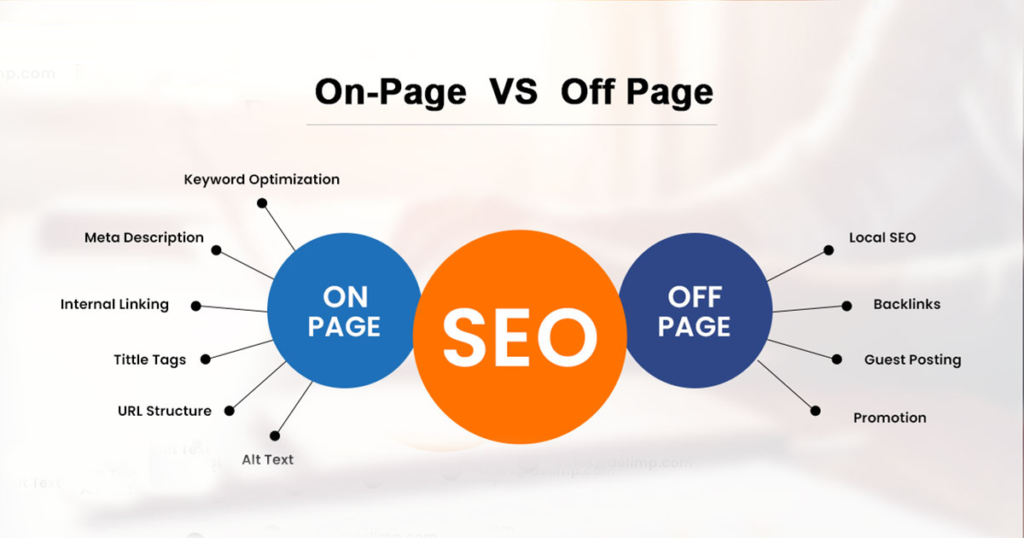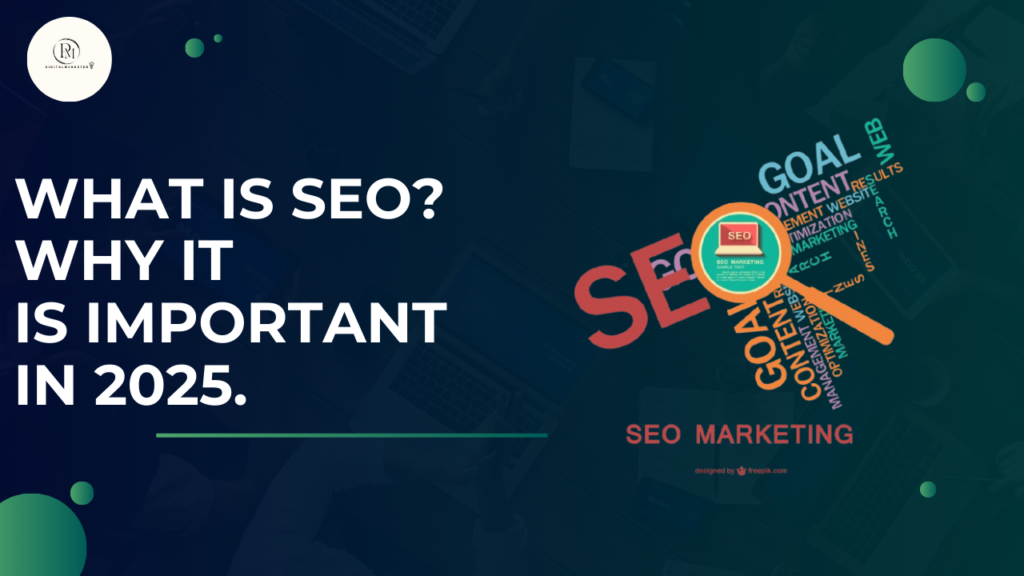Understanding SEO: A Brief Overview
SEARCH ENGINE OPTIMIZATION (SEO) is a crucial aspect of digital marketing. It refers to the process of optimizing your website to rank higher on search engine results pages (SERPs). The goal of SEO is to increase organic (non-paid) traffic to your website through better visibility. SEO OPTIMIZATION involves several strategies, including keyword research, content creation, and technical improvements.
The main objective of SEO is to improve the relevancy of your website’s content in relation to user queries. When you properly implement SEO MARKETING strategies, your website becomes more appealing to search engines like Google, resulting in higher rankings. GOOGLE SEO OPTIMIZATION is particularly important since Google remains the most widely used search engine globally.
SEARCH ENGINE MARKETING and SEO go hand-in-hand. While SEARCH ENGINE MARKETING (SEM) includes both paid advertising and organic SEO, SEO focuses primarily on optimizing your website without the use of paid ads. By understanding SEO techniques and staying updated with search engine algorithms, businesses can maintain a competitive edge in a digital-first world.
The Evolution of SEO
SEO has undergone significant transformations over the past two decades. In the early days, SEO OPTIMIZATION primarily revolved around keyword stuffing, where content was filled with keywords to rank higher. However, search engines like Google have evolved, making SEO strategies more sophisticated. Today, GOOGLE SEO OPTIMIZATION focuses on user experience, content quality, and technical aspects like site speed and mobile optimization.
As search engines became more intelligent, SEO MARKETING shifted towards a more holistic approach. Content quality, relevance, and authority are now key ranking factors. For instance, Google’s algorithms are designed to evaluate the expertise, authority, and trustworthiness (EEAT) of content. This means that quality content, produced by industry experts, is rewarded with higher rankings.
SEARCH ENGINE MARKETING has also seen a rise in the integration of voice search and AI-driven search results. As user behavior continues to evolve, SEO strategies must adapt to these changes. With mobile-first indexing and the continuous rollout of algorithm updates, businesses must focus on providing relevant, high-quality content to stay competitive in the ever-changing landscape of SEO.
The Benefits of SEO in 2025
As we approach 2025, the importance of SEO OPTIMIZATION continues to grow. SEO MARKETING offers businesses the opportunity to improve visibility, drive organic traffic, and enhance brand credibility. One of the biggest benefits of SEO is its long-term results. While paid advertising can provide quick results, SEO takes time to build but delivers sustainable and cost-effective results over the long run
In 2025, GOOGLE SEO OPTIMIZATION will continue to prioritize user experience, which includes site speed, mobile responsiveness, and user-friendly design. This shift towards a more user-centered approach means businesses must optimize their websites for mobile devices and ensure their content is easily accessible. The shift in SEO OPTIMIZATION emphasizes a user-centered approach.
Moreover, SEARCH ENGINE MARKETING will continue to be essential for businesses, especially with the rise of AI-powered search and personalized search results. By leveraging SEO techniques, businesses can ensure their content appears in relevant searches, helping them connect with a wider audience. In 2025, SEO remains a vital part of any digital marketing strategy, ensuring that businesses remain visible in a highly competitive market.

On-Page vs. Off-Page SEO in 2025
On-page SEO and off-page SEO are two pillars of an effective SEO strategy. Both contribute to higher rankings, but they focus on different aspects of SEO OPTIMIZATION.
On-page SEO involves optimizing elements on your website, such as meta tags, headers, URL structures, and content. The primary goal of on-page SEO is to ensure that your website is optimized for search engines and provides valuable, user-friendly content. GOOGLE SEO OPTIMIZATION for on-page factors includes ensuring proper keyword usage, improving site speed, and ensuring mobile compatibility.
Off-page SEO, on the other hand, refers to actions taken outside of your website to improve its visibility and authority. This includes link-building, social media engagement, and mentions from authoritative websites. Off-page SEO is crucial because it signals to Google that your content is trustworthy and credible. SEARCH ENGINE MARKETING often incorporates both on-page and off-page strategies to create a well-rounded SEO campaign.
In 2025, businesses will need to balance both on-page and off-page SEO tactics to succeed. Effective SEO MARKETING requires a comprehensive strategy that combines content creation, technical improvements, and building relationships with authoritative sites.
The Role of Content in SEO
Content plays a pivotal role in any SEO strategy. GOOGLE SEO OPTIMIZATION values high-quality, relevant, and well-structured content that satisfies user intent. In 2025, content remains a key ranking factor, as search engines continue to prioritize content that addresses the needs and questions of users. The role of content in SEO is to provide value to your audience while aligning with search engine algorithms.
SEO MARKETING heavily relies on content that is optimized for search engines. This includes using relevant keywords, optimizing meta descriptions, and providing in-depth, authoritative information. Content that resonates with users not only boosts rankings but also improves engagement and conversion rates.
SEARCH ENGINE MARKETING strategies also involve content marketing, which focuses on creating informative and engaging articles, videos, and other forms of content that attract backlinks. In 2025, businesses must focus on creating content that not only aligns with SEO OPTIMIZATION principles but also offers real value to users. By prioritizing high-quality content, businesses can maintain strong visibility on search engines and build trust with their audience. Content plays a crucial role in SEO by enhancing visibility, and leveraging expert digital marketing services can help optimize your content for better search rankings.
SEO vs. Paid Search: Which Strategy Should You Choose?
When deciding between SEO and paid search (PPC), it’s important to consider your long-term goals, budget, and target audience. SEO OPTIMIZATION offers long-term, organic visibility, whereas paid search provides instant traffic through ads. Both strategies have their advantages, but they serve different purposes within SEARCH ENGINE MARKETING.
SEO focuses on organic methods to increase your website’s visibility and traffic. It’s a slower process but offers sustainable results that improve over time. By investing in GOOGLE SEO OPTIMIZATION, businesses can create authoritative content that will naturally rank higher in search results.
Paid search, or pay-per-click (PPC), on the other hand, allows businesses to bid on keywords and have their ads displayed at the top of search results. While paid search can drive immediate traffic, it requires ongoing investment. Paid search is a good option for short-term goals or for businesses trying to get quick exposure.
In 2025, a balanced approach that combines SEO and paid search is often the most effective. By integrating SEO MARKETING and SEARCH ENGINE MARKETING strategies, businesses can drive both short-term and long-term results, ensuring they remain competitive in the digital space.
Key SEO Trends to Watch in 2025
SEO trends are constantly evolving, and staying ahead of these changes is crucial for businesses aiming to maintain high rankings. In 2025, one of the most significant trends will be the increasing importance of AI and machine learning in search engine algorithms. Google’s ability to understand user intent and deliver personalized results will continue to improve, making it essential for businesses to focus on high-quality, user-centric content.
Another trend to watch is the rise of voice search. As more users turn to voice-activated devices, optimizing for voice search will become increasingly important. This includes targeting conversational keywords and providing concise answers to common questions.
Mobile optimization will also be at the forefront of SEO strategies in 2025. With the majority of searches now occurring on mobile devices, businesses must ensure their websites are mobile-friendly and provide a seamless user experience.
SEARCH ENGINE MARKETING will evolve with these trends, incorporating AI-driven insights and a focus on voice and mobile search. By staying updated on these key SEO trends, businesses can stay ahead of the competition and continue to drive organic traffic to their websites.
Conclusion:
In 2025, SEO continues to be an essential component of any successful digital marketing strategy. As search engines like Google evolve, businesses must adapt by focusing on Google SEO optimization, user experience, and content quality. With the rise of AI, voice search, and mobile optimization, staying ahead of SEO trends will be crucial for maintaining visibility and driving organic traffic. A well-rounded approach, combining SEO marketing, search engine marketing, on-page and off-page tactics, and high-quality content, will ensure long-term success in the competitive digital landscape. By embracing these changes, businesses can enhance their online presence, improve user engagement, and achieve sustained growth. Mastering SEO is vital for success in 2025, and a digital marketing course is the perfect way to equip yourself with the skills to leverage its power effectively.”
F.A.Q.
SEO (Search Engine Optimization) is the practice of improving your website’s visibility on search engine results pages (SERPs) by optimizing various elements like content, keywords, and technical factors. This helps to increase organic traffic to your website.
Google SEO optimization focuses on improving your website’s ranking on Google search results. Since Google is the most widely used search engine, optimizing for its algorithms ensures better visibility, higher rankings, and more organic traffic.
SEO (Search Engine Optimization) focuses on improving your website’s organic ranking on search engines, while SEM (Search Engine Marketing) includes both SEO and paid advertising (PPC). SEO delivers long-term, sustainable results, while SEM can provide quicker visibility through paid ads.
SEO has evolved from keyword stuffing to a more user-focused strategy that prioritizes content quality, relevance, and user experience. Modern SEO strategies now consider technical aspects like site speed, mobile optimization, and AI-driven search algorithms.
Content is crucial for SEO because search engines prioritize high-quality, relevant content that answers user queries. Well-structured and valuable content improves your website’s rankings and helps increase user engagement and trust.
On-page SEO involves optimizing elements directly on your website, such as content, meta tags, and URL structure. Off-page SEO refers to actions outside your website, such as link-building and social media engagement, to improve your website’s authority and visibility.
SEO is a long-term strategy, and it may take several months to see significant results. However, once SEO efforts begin to pay off, the traffic and visibility gained are sustainable and cost-effective in the long run.


